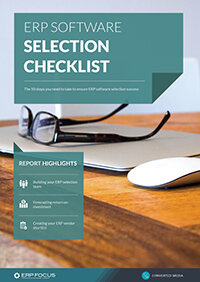Five questions to ask potential electronics ERP vendors
Unless you operate in the electronics sector, many folks believe that the manufacturing discipline is just like any other; you design, you build, you distribute, you sell. However, in the case of creating and selling electronic components, particularly when they involve the production of small sub-assemblies such as chipsets or PCBs, typical challenges are magnified considerably.
There are at least five major areas of concern that many other durable goods manufacturers don’t have to deal with that, in turn, directly relate to queries associated with the selection and implementation of an ERP platform. So before you buy, here are some key areas to consider, and key questions to ask electronics ERP vendors before you buy.
Short and/or ad-hoc production lifecycles
The delivery and integration of electronic components is largely dependant on market demand. Consequently, if a particular product is found to be unappealing to the majority of buyers, that product will disappear very quickly, and often without notice.
From an ERP query perspective, this creates a two-fold consideration;
- Are active production, and inventory management processes highly-adept when it comes to ‘turning on a dime’?
- Are applied cost-control processes equally flexible, and able to quickly spin-down or spin-up any quote-to-production-to-completion chain accurately, and with a minimum of manual effort?
International supply chain complexities
We operate in a global market and this intrinsic challenge is maximized when it involves supply chain management in the case of electronic component production. It should be expected that even a simple piece, is likely to involve multiple production stages located internationally before those elements end up in a finished product. Therefore, given the dissimilarities from locale to locale production standards must be compliant throughout, meaning that the electronics ERP system in question must be compliant accordingly.
Electronics ERP vendors should therefore be able to answer this central question;
- Is your system capable of accepting and managing multiple production standards, as part of a fully-integrated production chain?
On-demand scalability
Clearly production rates for electronic components are increasing, and consequently any ERP platform must be scalable enough to deal with increased volumes. However, given the vagaries of any market-driven product, things can change quickly, so a fair degree of flexibility must also apply. In this case the question becomes
- Is your ERP able to scale up or down on demand?
- In the latter case specifically, can it spool down without creating considerable clutter at the database level?
International ‘green’ standards
Today’s manufacturing is always impacted by environmental concerns, particularly when it involves the production of hazard-based components such as chips, or PCBs. Consequently, in the case of an ERP selection this awareness begs the following question;
- Is the platform capable of accepting, managing and monitoring the production of components that are policy or safety-based compliant?
Margin monitoring
In the case of the production of electronic components, that are sometimes based on weight, rather than unit count, rigid cost accounting and margin rules prevail throughout the electronics sector. This means that active margin monitoring must be both active and obvious. Therefore;
- Is the ERP platform capable of accepting and producing margin alerts that provide for the necessary level of accounting ‘safety’?
These are only some of the questions necessary to ensure that you’re buying the right product, but it should give you a reasonably solid beginning regardless.
Free white paper

Electronics ERP Buyers Guide
An all-around look at electronics ERP features, pricing and more

Featured white papers
-

ERP Software Pricing Guide
Get the latest pricing information on over 80 popular ERP systems, and learn how to budget for your ERP project in our free guide
Download -

60-Step ERP Selection Checklist
Get the comprehensive checklist for your ERP selection project
Download -

7 steps to selecting discrete manufacturing ERP
17 pages of ERP selection advice and industry requirements analysis
Download
Related articles
-

The best ERP systems for process manufacturing
Consider these ERP systems when selecting your next process manufacturing ERP
-

How the right ERP can help you launch a successful omnichannel business
Petersen Zhu, CEO of DigitBridge and Vibes Base, shares how to create a scalable omnichannel stra...
-

5 ERP pricing definitions you need to understand
Have you mastered the ERP pricing lexicon yet? Getting to grips with these five definitions is a ...

